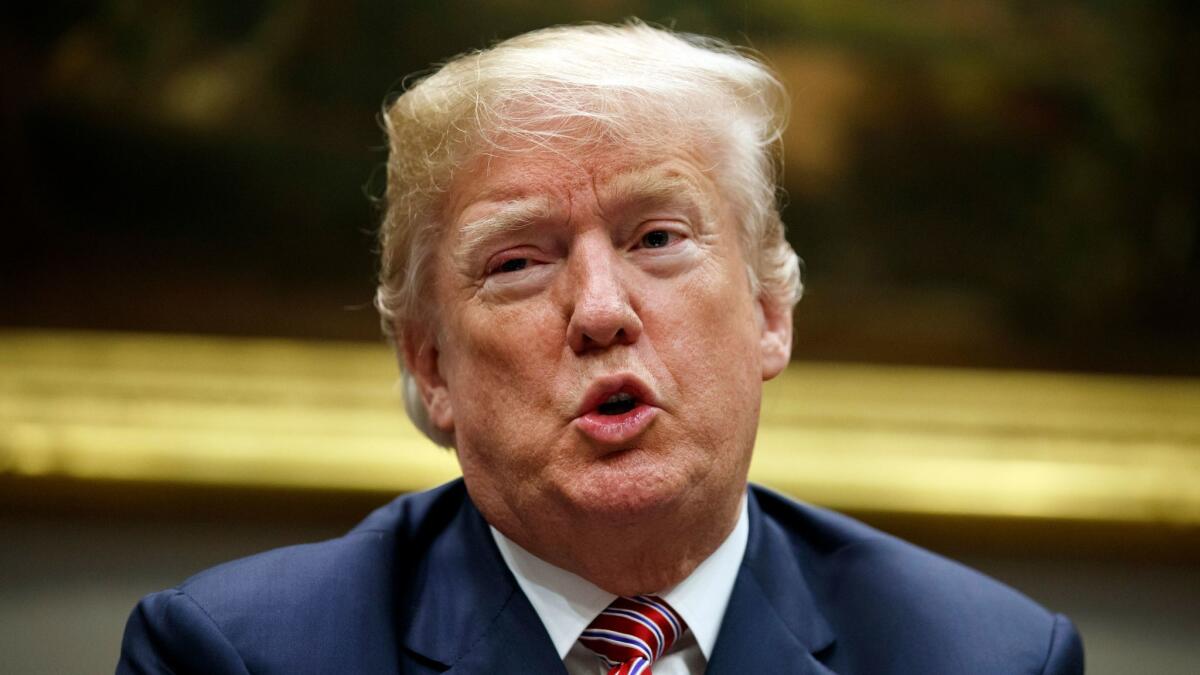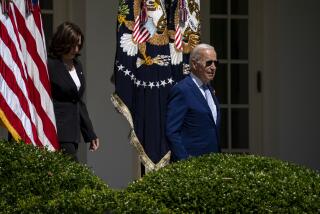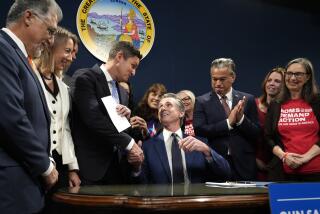Trump urges lawmakers to pass ‘comprehensive’ gun law and stand up to gun lobby

President Trump, in an extraordinary White House session open to reporters, told a bipartisan group of lawmakers on Wednesday to send him “one terrific bill” on gun safety, including restrictions based on people’s age and mental health, and stronger background checks — proposals long opposed by the gun lobby.
The president was noncommittal when a couple of lawmakers called for a ban on assault weapons like the AR-15 semiautomatic rifle used in the Parkland, Fla., school shooting two weeks ago and other mass shootings, though few if any expect him to support it given gun groups’ resistance. He alluded to his signature proposal to arm some teachers, but said he would defer to lawmakers on the proposal, which has drawn much opposition.
For the record:
9:35 p.m. Feb. 28, 2018An earlier version of this article said that Trump had hosted a roundtable on immigration late last year. That roundtable was held in January 2018.
Throughout the meeting, the president sought to play the conciliatory facilitator — the deal-signer if not the deal-maker — on one of the most divisive issues of past decades.
“I will sign it and I will call whoever you want me to if I like what you’re doing,” Trump said, adding that legislation must be “very, very powerful on background checks” and “very strong on mentally ill.”
“Let’s get it done,” he said. “That’s what we have to do.”
In response, Republican and Democratic lawmakers said they’d need his backing for political cover against the president’s allies in the powerful gun-rights lobby to pass any legislation. Senators also gently reminded Trump of the difficulty of getting enough votes — at least 60 — to pass anything in their chamber.
It was the president’s latest call to action in the wake of the Florida shooting, but once again he left lawmakers and observers confused about exactly what he wanted to achieve. During the hourlong roundtable discussion that played out entirely in front of television cameras, Trump told the sponsors of pending bills narrowly written to deal with bolstering background checks to “make it much more comprehensive.”
Sen. John Cornyn of Texas, the Republican who is the second-ranking Senate leader, was among those who schooled Trump in the realities of the legislative process. “If you can get 60 votes,” Cornyn said, he’d be all for it.
The brainstorming session was Trump’s fourth since the Feb. 14 mass killing at Marjory Stoneman Douglas High School that killed 14 students and three educators, his first with members of Congress back from recess. Despite his admonitions to lawmakers to stand up to the gun lobby — “You’re afraid of the NRA,” he told them — the president appeared to protect against ideas that are opposed by the National Rifle Assn., whose leaders have advised him on the subject in recent days.
Trump mentioned several times that lawmakers should not include in a bill a ban on “bump stocks.” Such devices, used by the shooter who killed scores at a Las Vegas concert in October, turn legal semiautomatic rifles into virtual machine guns. Instead, he said, Congress should let him do that through executive order.
Trump has directed the Justice Department to propose a federal regulation banning bump stocks, whereas an executive order would not be an appropriate measure. Federal regulators have said they need authority from Congress. A regulatory ban would probably invite lawsuits from gun manufacturers, agency officials say. The NRA has said it could support a regulation on bump stocks, but not a law.
After days of vacillating since he had lunch on Sunday with three NRA executives, Trump indicated he remains open to another proposal the NRA doesn’t like, his idea to set a federal minimum age of 21 for buying semiautomatic weapons. He said he would give “very serious thought” to that idea, which seemed a step back from last week, when he strongly and repeatedly called for it — before the NRA intervened in opposition.
Trump also raised eyebrows by suggesting that law enforcement officials should be able to confiscate people’s firearms without a court order to prevent potential tragedies. “Take the guns first, go through due process second,” he suggested.
Trump also said several times that he wants to be the president who finally gets something done to prevent school shootings. When Sen. Chris Murphy (D-Conn.) noted the difficulty of passing a gun law, Trump shot back, “You’ve got a different president now.”
“The gun lobby has had a veto power,” Murphy replied, adding, “It’s going to have to be you that brings the Republicans to the table.” Trump responded: “I like that responsibility.”
A couple of Republicans seconded the notion that Trump uniquely can provide them cover if he backs them up.
“You can lead on this as nobody else can,” said Rep. Brian Mast, a Florida Republican who lost his legs while serving in Afghanistan and who recently called for a ban on the sort of assault weapons he used in combat.
Trump acted as if he wanted that mantle of leadership. He listened to ideas and sometimes made clear what a bill would have to have in order to win his support. Unspoken in the conversation, however, was the worry of many Republicans that Trump will push them to take difficult stands on gun control and then reverse course, leaving them without political cover.
He has done such a thing before. Trump held a similar roundtable in January on immigration, calling on lawmakers to send him a bipartisan bill that would allow up to millions of immigrants in the country illegally to gain legal status, only to later toughen his demands and effectively kill several measures.
The bipartisan group of lawmakers meeting about gun policy drew the president out on a few of his apparent commitments.
Trump suggested that Sens. Pat Toomey (R-Pa.) and Joe Manchin (D-W.Va.) add the age minimum to their bill that failed in 2013, after the school killings in Newtown, Conn. When Toomey said they didn’t include it, and Trump countered that lawmakers were “afraid of the NRA,” Toomey pushed back, giving Trump a taste of the contentiousness he faces.
Toomey told Trump that “the vast majority” of 18-to-20-year-old Pennsylvanians with long guns are law-abiding and “to deny them their 2nd Amendment rights isn’t going to make anyone safer.”
A few minutes later, Trump effectively killed a House-passed gun bill that House Republican leaders have been pressing for the Senate to approve. When the third-ranking House leader, Rep. Steve Scalise (R-La.), promoted the bill, which pairs background check changes with provisions requiring all states to honor concealed carry permits of gun-toting visitors from states that allow the permits, Trump cut him off: “I’m with you but let it pass as a separate bill.” He added, “You’ll never get it passed.”
Scalise and other House Republicans were clearly stunned, and senators, notably California Democrat Dianne Feinstein, pleased. The concealed-carry provision, as Trump indicated, cannot pass in the Senate and is the main reason the House and Senate haven’t yet agreed on legislation improving background checks.
Trump urged the lawmakers to be as tough as they can and still come up with something that will pass, even as he brushed off Feinstein’s suggestion that he bless the idea of discussing a ban on assault weapons.
“I really believe it has to be very strong,” Trump said. “I’d rather have you come down on the strong side instead of the weak side. The weak side would be much easier. I’d rather have you come up with a strong, strong bill.”
Feinstein was seated next to Trump. In January he had attacked her in a tweet as “Sneaky Dianne Feinstein” for her actions in the Senate’s probe of Russia’s meddling in the 2016 election and possible Trump campaign coordination, and he expressed hope she’d draw election opposition.
The Democrat took advantage of her proximity to the president to at one point hand him a paper showing a drop in the number of assault weapon deaths in the decade 1994 to 2004, when a ban was in effect, and the rise in deaths since. Feinstein literally put the issue on the table for the first time since the Parkland shootings, since Trump has ignored it to date.
The president was polite, took the paper, and thanked Feinstein.
The Associated Press contributed to this report.
Twitter: @cparsons
More to Read
Get the L.A. Times Politics newsletter
Deeply reported insights into legislation, politics and policy from Sacramento, Washington and beyond. In your inbox three times per week.
You may occasionally receive promotional content from the Los Angeles Times.







